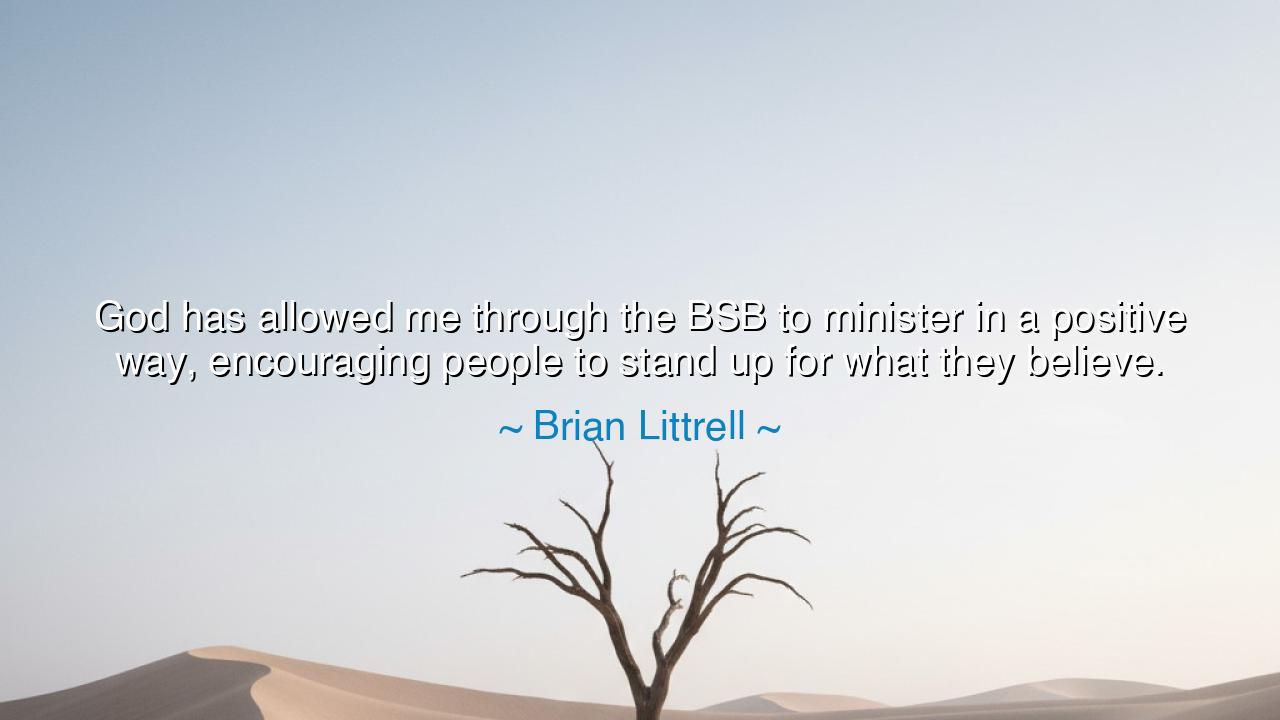
God has allowed me through the BSB to minister in a positive
God has allowed me through the BSB to minister in a positive way, encouraging people to stand up for what they believe.






Hear the words of Brian Littrell, who with humility and gratitude proclaimed: “God has allowed me through the BSB to minister in a positive way, encouraging people to stand up for what they believe.” These are not merely the reflections of a musician, but the testimony of a man who sees his art as a vessel of purpose. For in his heart he knew that fame without meaning is emptiness, but fame with faith becomes a platform for hope, courage, and transformation.
The origin of this saying lies in Littrell’s journey as a member of the Backstreet Boys, a group that captured the hearts of millions across the globe. In the whirlwind of concerts, albums, and worldwide fame, Littrell held to his Christian faith, believing that his position in the public eye was not chance but calling. He saw his role not only as entertainer but as one entrusted by God to uplift and encourage, to use the songs and the stage as a kind of ministry. Thus, what for others was merely stardom, for him became stewardship.
History offers us echoes of this same spirit. Consider Johann Sebastian Bach, who signed his great works with the initials Soli Deo Gloria—“To God alone be the glory.” Though his music graced kings and churches alike, he saw his compositions as offerings, his genius as ministry. In the same way, Littrell saw that even within the popular culture of the modern world, one could still serve, still shine light, still direct souls toward courage and truth.
The deeper meaning of Littrell’s words is that influence is never neutral. Every platform, whether large or small, is a chance to guide others either toward despair or toward hope, toward apathy or toward action. By choosing to be positive, Littrell shows that the calling of the artist, the leader, and the believer is to inspire others to rise. Encouraging people to “stand up for what they believe” is no small thing, for in a world filled with fear and conformity, such courage becomes the seed of change.
The lesson for us is clear: whatever gifts we hold, whether music, words, leadership, or daily kindness, we must see them not as possessions but as instruments. Littrell’s stage was the arena of global music, but each of us has our own stage—the home, the workplace, the community. And on each stage, God entrusts us with the chance to minister, to build up, to strengthen others with encouragement and truth.
To the youth, I say: do not think your gifts are too small to matter. To parents, I say: your daily acts of love are ministries that shape destinies. To artists, I say: let your creativity not only entertain but also uplift. And to all, I say: remember that the truest calling of success is not the applause you receive, but the positive impact you leave on hearts and lives.
Practical action lies before us: speak words that encourage others to pursue their convictions. Use your talents, however humble, as instruments of hope. Resist the temptation to use your influence for vanity alone; instead, direct it toward what builds up and inspires. Ask yourself each day: how can I minister, even in small ways, to those around me? For in such acts, the ordinary becomes sacred.
Thus Brian Littrell’s words endure: “God has allowed me… to minister in a positive way.” They remind us that no stage is too grand, and no life too small, to become a vessel of light. Let this truth be carried forward: success is not measured by fame or wealth, but by the courage to use what has been given to you to strengthen the faith, the resolve, and the dignity of others. For in this lies the true ministry of life.






KUKizzz UwU
It’s uplifting to think about using influence for positive purposes, like ministry. However, is there a difference between encouraging people to stand up for their beliefs and leading them towards something more specific or personal? How can we ensure that this encouragement doesn’t unintentionally push others toward extreme views?
TDtrung dinh
The notion of encouraging people to stand up for their beliefs sounds empowering, but what about the consequences of doing so? Are there risks in becoming too vocal or advocating for something that may not be well received? How do we measure the balance between standing up for what’s right and maintaining harmony in our communities?
NQDao Nhu Quynh
Brian Littrell’s mention of the BSB (Backstreet Boys) as a platform for ministry is interesting. Do you think celebrity status can be used positively to influence others? Or is there always a risk of it being more about personal fame than genuine encouragement?
MN•I hate my name•
The idea of God allowing someone to minister positively is powerful, but it also begs the question of how people interpret their purpose. Is everyone given a clear mission to help others? And if so, how do we know we're truly fulfilling it or just following societal expectations?
D9Minh Anh Dao 9/4
It’s inspiring to think of someone using their platform, like Brian Littrell does, to encourage others to stand up for their beliefs. But it also raises the question—what happens when someone's beliefs contradict those of others? How do we navigate this difference while maintaining respect and understanding for all parties involved?